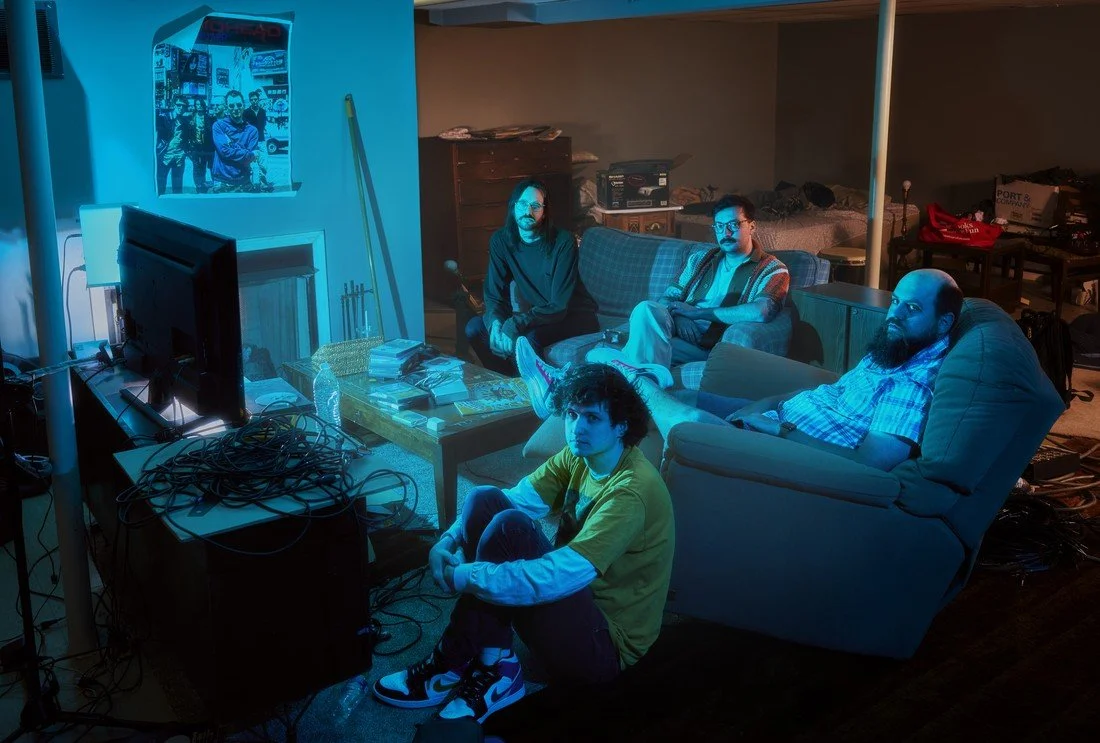Foxing - ‘Foxing’ review
Foxing
On 13 September, Foxing released their fifth studio album, the self-titled Foxing. More than just a new chapter in their discography, this album marks the band’s full embrace of independence. Self-recorded, self-produced, and self-released under their own label, Grand Paradise, Foxing is a testament to their artistic autonomy. The band set out to craft a record that captures the raw energy and emotion of their live performances, resulting in a fearless, genre-bending album that feels both deeply personal and musically ambitious.
Foxing is an emotional whirlwind, exploring themes of anger, sadness, nihilism, and loneliness. These raw, intense feelings make it one of the band’s most challenging albums to date, both for themselves and their audience. Rather than aiming for mainstream accessibility, they have pushed their sound in directions that reflect their internal battles and the creative freedom they’ve earned. In doing so, they’ve created what may well be the defining album of their career, blending their past achievements with new sonic territory.
The album’s sound is an intricate blend of genres—emo, post-rock, math-rock, hardcore, and experimental electronics all swirl together to create a rich and immersive experience. Each listen reveals new details, allowing listeners to sink deeper into its sonic complexity. The album’s opener, "Secret History," sets the tone perfectly. It starts with glitchy, delicate electronics reminiscent of Radiohead’s post-OK Computer era, with Conor Murphy’s falsetto weaving through brass and synths. Just as the listener begins to settle into this serene atmosphere, the track erupts into a chaotic storm of anguish, with Murphy’s screams tearing through the calm. The contrast between beauty and fury perfectly encapsulates the unpredictable nature of the album, a blend that feels both arresting and refreshing.
This unrelenting energy carries over into "Hell 99," an aggressive, cathartic explosion of sound that opens with Eric Hudson screaming, "Carson MTV! Bizkit NYE! Fuck! Fuck! Fuuuck!"—a visceral release of pent-up frustration. Yet, beneath the chaos, the track features a synth-driven breakdown that feels oddly danceable, as though the listener is invited to lose themselves in the mayhem. It’s more than just raw anger—it’s a dance with destruction, inviting listeners to let go and embrace the disorder. By the time the song ends, an overwhelming sense of emotional devastation lingers, leaving the listener feeling drained yet strangely exhilarated.
Foxing first announced the album with a deadpan "live" press conference—empty, of course (we still suspect our invite got lost in the transatlantic post). They also introduced "Greyhound" as the lead single, a track that stands out as one of the most compelling on the album. "Greyhound" is an introspective, expansive epic that perfectly captures the depressive cycle of burnout. The song's brooding, echoing drums pair with introspective lyrics to create an atmosphere that feels at once vast and deeply personal.
In "Greyhound," the band delves into the struggles of living up to their own legacy. It’s been over a decade since The Albatross made them one of the defining voices of the mid-2010s emo revival, and the weight of expectation clearly looms over them. The lyrics, "I've been feeling like my peak is in my past" and "I've got nothing left to give," reflect a sense of creative exhaustion, while surreal imagery—like a blue whale grazing and disintegrating—underscores the themes of decline and disillusionment. The track encapsulates the tension between the desire for artistic freedom and the pressure to recreate past success, mirroring Foxing’s own journey since reshaping the emo landscape.
"Barking" takes a more experimental route, blending atmospheric melodies with production that calls to mind the spaciousness of Sigur Rós and the playfulness of MGMT. It’s a track that deals with disconnection, both internal and external, as the narrator reflects on feelings of alienation. The opening lyrics compare old clothes to "cicada shells," highlighting a sense of abandonment and shedding one’s former self. The track’s title, "Barking," evokes the eerie image of a friend’s "barking," a metaphor for fractured relationships and disillusionment with life. As the song unfolds, a surreal chorus of "kissing yourself to prime the rain" serves as a poignant metaphor for attempting to find meaning in an emotionally barren landscape.
One of the album’s most powerful moments comes with "Gratitude." This track demonstrates Foxing’s ability to merge the emotional weight of emo with the expansive soundscapes of post-rock, creating an intensely cathartic experience. "Gratitude" is driven by a deep yearning to escape from oneself, a desperate desire to reset both body and mind. The protagonist is paralysed, unable to escape their stagnant state, symbolised by missed alarms and the overwhelming sense of being trapped. The song’s furious energy builds as the narrator voices their need for something drastic, longing to live in a fugue state, to "hear God yelling," and to "sow rage into my brain." The emotional crescendo is both sonically and lyrically powerful, making "Gratitude" a standout moment on an already impressive album.
"Dead Internet" addresses a different kind of disconnection—the overwhelming and nihilistic experience of living in a hyper-connected world that feels emotionally hollow. The song’s glitchy, dissonant sound mirrors its theme, as it builds into a chaotic cacophony that reflects the disorienting overload of modern life. The mechanical rhythm underscores the track's relentless, suffocating energy, capturing the friction between the individual and a world increasingly driven by technology. As horns rain down from the heavens, the song evokes a final reckoning, a moment where the collapse of order seems both inevitable and liberating.
The album closes with "Cry Baby," a track that blends tenderness with the harsh realities of regret. Opening with the poignant lines, “If I could I'd start over again, it’s been fun but I'd change everything,” the song reflects on love, loss, and the desire for second chances. The imagery of coming home to a smiling partner and dancing through the house creates a sense of warmth and intimacy, yet the track is tinged with vulnerability. By the end, the narrator resolves to "shut it down and lock it up," revealing a deep fear of losing that connection or being hurt. As the song fades out with a sound clip of a thirteen-year-old Hudson telling Murphy, “I don’t think the song is as good as it could be, but it’s coming along,” it serves as a reflection on the album itself—a reminder that Foxing is still evolving, still perfecting their craft.
Foxing is a multifaceted album that balances emotional intensity with experimental soundscapes, fusing elements of emo, post-rock, and hardcore into a cohesive yet chaotic artistic statement. It’s an album that reveals new layers and themes with each listen, requiring patience but rewarding it generously. The fact that the album is entirely self-recorded, self-produced, and self-released speaks volumes about the band’s commitment to independence and creative control.
By handling every aspect of production, Foxing have asserted their desire to remain true to their vision, even if that means diverging from commercial expectations. In Foxing, the band has crafted an album that feels like a culmination of everything they’ve done before while pushing them into new sonic realms. It’s a deeply cathartic exploration of emotion—anger, sadness, nihilism, loneliness—and a testament to the risks and rewards of artistic freedom. For fans willing to take the journey with them, it’s a challenging but deeply rewarding experience. Foxing has never sounded more confident in their uncertainty, more assured in their vulnerability, and Foxing is a triumphant declaration of both.
Foxing from Foxing is out now via the band’s own Grand Paradise label and available on all good streaming platforms.


































